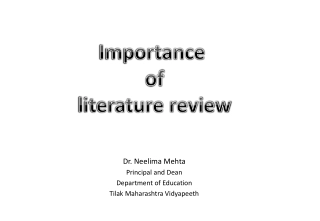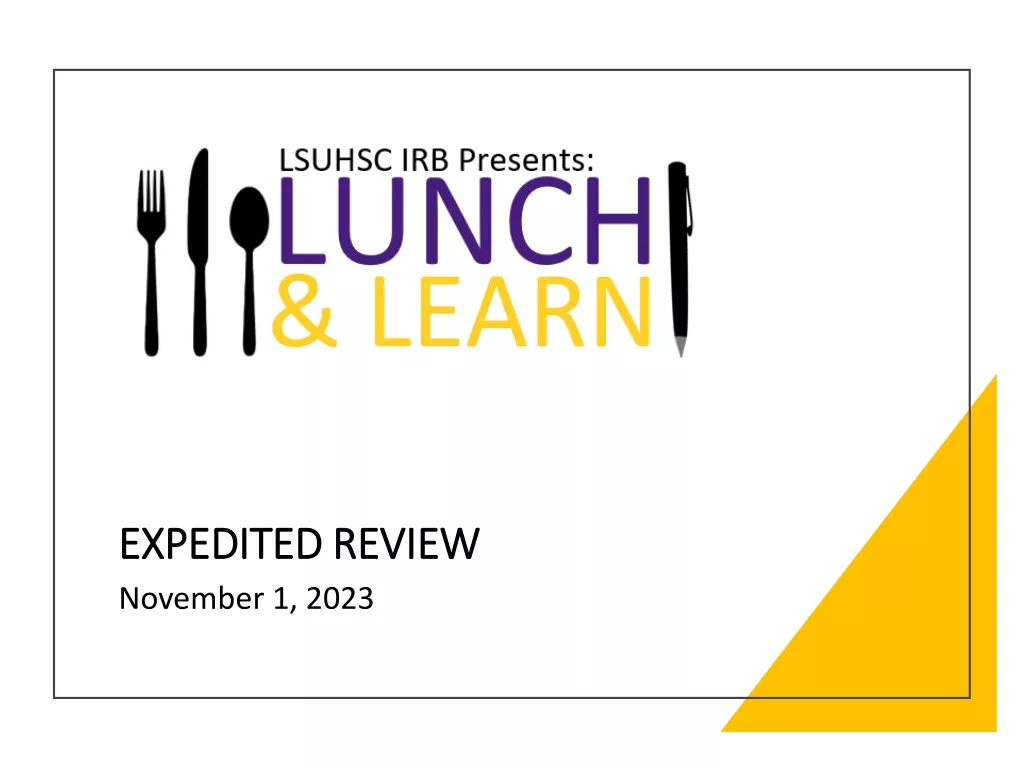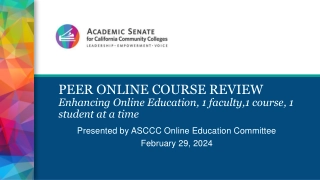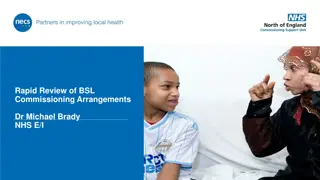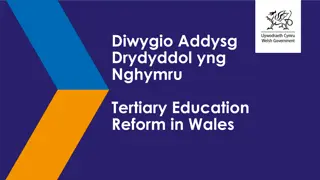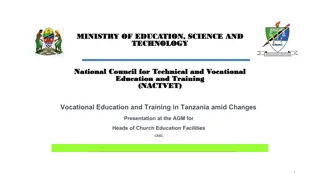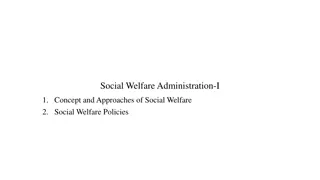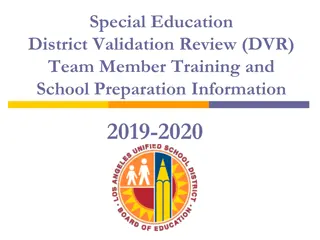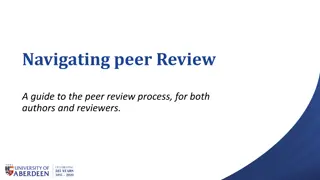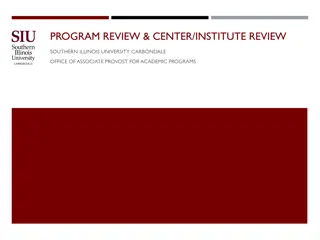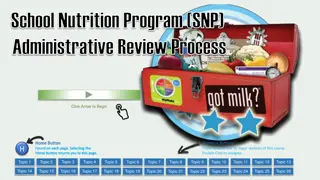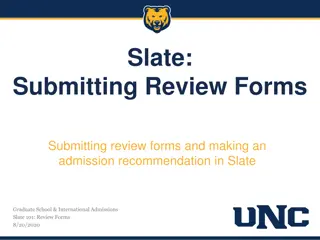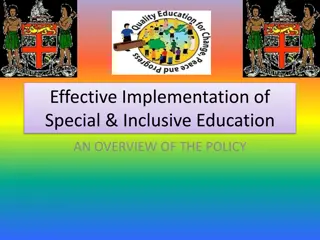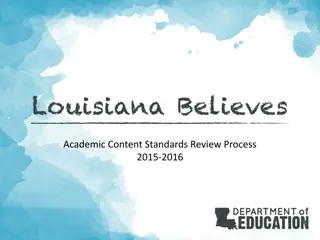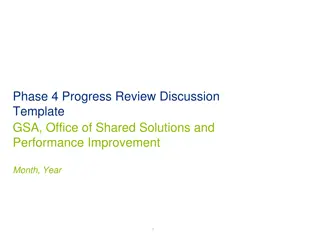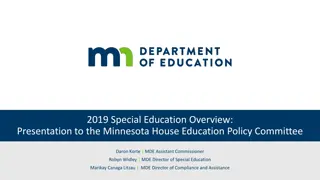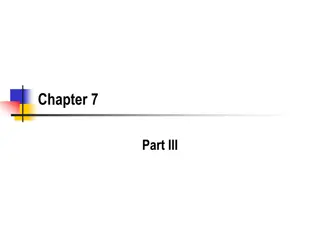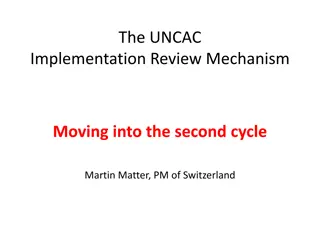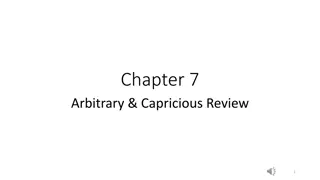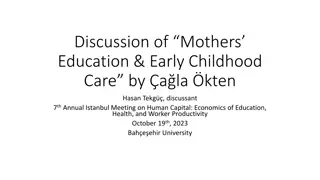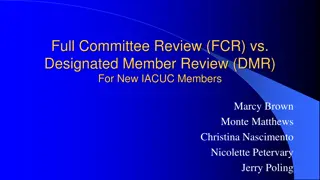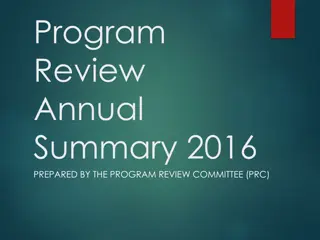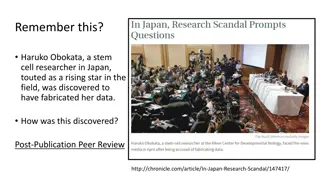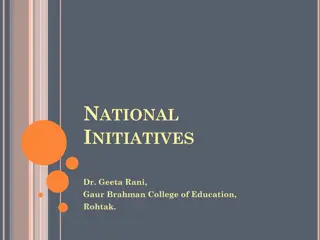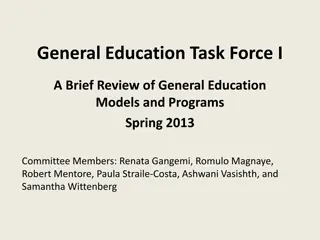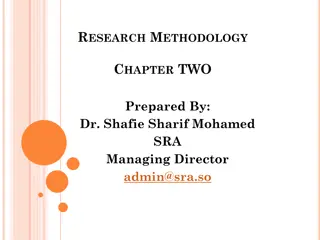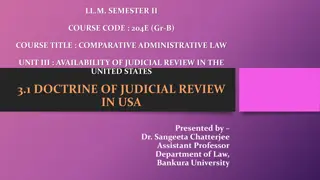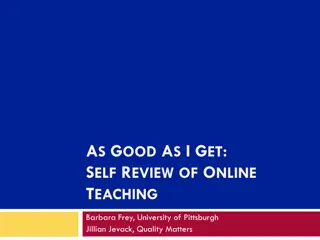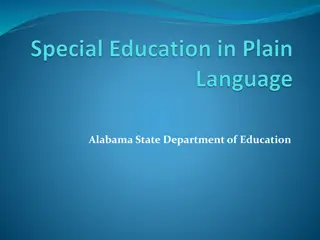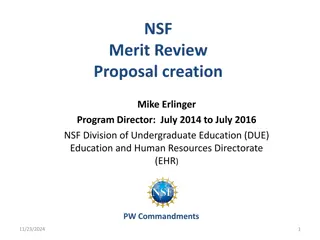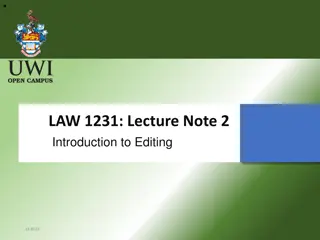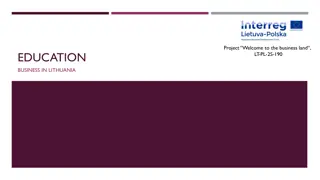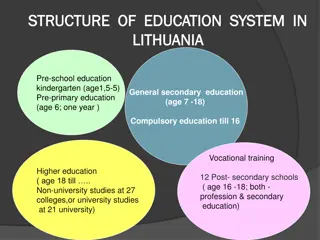Importance of literature review
A literature review is a critical component of any research endeavor, providing a comprehensive analysis of existing knowledge in a particular field. This review helps in clarifying conceptual issues, understanding research design, persuading examiners, and contributing new insights to the subject a
0 views • 28 slides
IRB Review Process for Expedited Research
Learn about the significance of IRB review, levels of review, and categories of expedited review. Discover the criteria for IRB review, including whether the study involves human subjects and contributes to generalizable knowledge. Explore the different levels of IRB review and the specific categori
4 views • 11 slides
Enhancing Online Education: ASCCC Online Course Review
Explore the ASCCC Online Course Review on Enhancing Online Education presented by the ASCCC Online Education Committee. Learn about the CVC-OEI Course Design Rubric and its impact on local peer online course review initiatives. Discover how the California Virtual Campus Online Education Initiative a
2 views • 24 slides
Educational Neglect
Explore the concept of educational neglect, responsibilities for ensuring a suitable education, and the United Nations Convention on the Rights of the Child pertaining to education. Topics include school attendance, children missing education, home education, and the role of various parties like loc
1 views • 13 slides
SACE Teachers Conference: Enhancing Professional Development in Education
The SACE Teachers Conference focuses on improving teacher education through developing a National Framework for Teacher Education in SA. The Ministerial Committee on Teacher Education aims to create a coordinated system for both initial and continuing professional education. Recommendations include
4 views • 34 slides
Transforming Tertiary Education in Wales: The CTER Act Journey
Background Hazelkorn Review highlighted the need for a step-change in Wales' post-compulsory education system. The Tertiary Education and Research Act established the Commission for Tertiary Education and Research (CTER) to oversee further education, higher education, adult learning, apprenticeships
3 views • 18 slides
Studies after basic education
Finnish education system offers various pathways for students after basic education, including upper secondary education, vocational training, and post-secondary studies. Compulsory schooling ensures that all young individuals receive education until the age of 18, with options for further studies i
133 views • 15 slides
Rapid Review of BSL Commissioning Arrangements by Dr. Michael Brady
NECS commissioned a Rapid Review of British Sign Language (BSL) service provision to identify areas for improvement in access and patient experience, especially during the Covid-19 pandemic. The review focused on stakeholder engagement, options appraisal for commissioning responsibility, and recomme
9 views • 19 slides
Tertiary Education Reform in Wales: The Future of Learning
The Tertiary Education and Research (Wales) Act aims to establish the Commission for Tertiary Education and Research (CTER) to oversee strategy, funding, and supervision of post-compulsory education in Wales. This legislation dissolves the Higher Education Funding Council for Wales (HEFCW) and focus
4 views • 20 slides
Enhancing Capacity of Church Education Facilities for Education Transformation
The National Council for Technical and Vocational Education and Training (NACTVET) in Tanzania is focused on enhancing the capacity of church education facilities to implement ongoing education transformation. The presentation outlines the structure of Vocational Education and Training (VET) in Tanz
0 views • 21 slides
Education Reforms in India: Wood's Despatch and the Impact of Macaulay's Minute
The background leading to Wood's Despatch in 1854 in India, following the Charter Act of 1813 and 1833, marked significant changes in the educational landscape. The shift towards English education, influenced by Macaulay's Minute, had both positive and negative impacts on the Indian education system
0 views • 29 slides
Importance of the Right to Education in Social Welfare Policies
The right to education is a fundamental human right recognized in various international conventions and laws. It includes provisions for free, compulsory primary education, accessible secondary education, and equitable higher education. Upholding this right is crucial for promoting equality, fosteri
1 views • 19 slides
Special Education District Validation Review (DVR) 2019-2020 Overview
The Special Education District Validation Review (DVR) is a mandated internal monitoring process for LAUSD Special Education programs. It involves reviewing 25% of schools annually to identify and remediate noncompliance issues at both school and systemic levels, ensuring adherence to District polic
0 views • 32 slides
Navigating Peer Review: A Comprehensive Guide for Authors and Reviewers
In academic publishing, peer review plays a crucial role in maintaining publication quality. This guide offers a detailed overview of the peer review process for both authors and reviewers, covering topics such as receiving review invitations, manuscript submission, writing effective reviews, and mo
0 views • 31 slides
Southern Illinois University Carbondale Office of Associate Provost for Academic Programs Review
The Program Review & Center/Institute Review at Southern Illinois University Carbondale aims to educate attendees on IBHE requirements, the review process, conflict of interest policies, self-study writing, on-site review involvement, financial support, and available resources. The IBHE mandates rev
0 views • 37 slides
School Nutrition Program (SNP) Administrative Review Process
The School Nutrition Program (SNP) Administrative Review Process is a vital aspect of ensuring compliance with National School Lunch Program (NSLP) and School Breakfast Program (SBP) requirements. This process involves assessing critical areas of review and general accountability to maintain program
3 views • 70 slides
Slate Graduate School & International Admissions Review Forms Overview
Explore the process of submitting review forms and making admission recommendations in Slate Graduate School & International Admissions, including automatic assignment of applications to queues, review of Staff Review Forms, and recommending admission or denial through Faculty Review Forms. Learn ab
1 views • 8 slides
Effective Implementation of Special & Inclusive Education Policy Overview
Providing an overview of the effective implementation of special and inclusive education policy, this content discusses inclusive education, special education, traditional education systems, historical dissatisfaction with dual systems, and the importance of the policy for children with special need
0 views • 29 slides
Louisiana Academic Standards Review Process 2015-2016 Overview
Louisiana's education system undergoes a comprehensive review process for academic standards in English language arts and mathematics, led by professional educators. The process aims to enhance existing standards based on local input and public feedback, ensuring alignment with state laws and prepar
0 views • 22 slides
Phase 4 Progress Review Discussion Template Overview
This template guides a Progress Review discussion involving a Customer, Provider, and Key Stakeholders. It addresses the gaps in common business requirements, risk assessment confidence, deployment readiness, budget impacts, migration costs, and more. The template provides instructions for completin
0 views • 25 slides
Special Education Overview Presentation to Minnesota House Education Policy Committee
Presentation to the Minnesota House Education Policy Committee on Special Education Overview, including information on the Individuals with Disabilities Education Act (IDEA), IDEA Part B and Part C services, and guidelines for children with disabilities. The presentation covers key aspects such as f
1 views • 29 slides
Judicial Review in Administrative Law
In this chapter, the concept of judicial review in administrative law is explored, focusing on the scope of review set by Congress, including trial de novo and independent judgment on evidence. Different standards of review, such as clearly erroneous and substantial evidence, are discussed, highligh
0 views • 23 slides
UNCAC Implementation Review Mechanism: Moving Towards the Second Cycle
The UNCAC Implementation Review Mechanism is progressing into its second cycle, with a focus on evaluating challenges and terms of reference at the conclusion of each review cycle. The performance assessment has highlighted achievements in enhancing awareness and involvement of civil society/private
0 views • 7 slides
Arbitrary and Capricious Review in Administrative Law
Arbitrary and Capricious Review refers to a highly deferential standard applied to agency decisions, requiring agencies to demonstrate compliance with statutory requirements. The landmark case of Citizens to Preserve Overton Park v. Volpe set the precedent for a thorough judicial review based on the
0 views • 8 slides
Global Peer Review Activities and Future Plans Overview
This document highlights the recent peer review activities conducted by the Subcommittee on Peer Review, focusing on the accomplishments and upcoming plans for enhancing peer review processes. It includes insights from the Global Flyer Survey, training programs, and the development of guidelines, al
0 views • 3 slides
Importance of Mothers in Early Childhood Education
Mothers play a crucial role in early childhood education, especially in developing countries where many children lack access to formal education. Studies show a strong link between a mother's education level and the time she invests in her child's learning. By examining a 1997 education reform, rese
0 views • 8 slides
Insights on Higher Education and Latinos in California - March 2018
This data analysis focuses on higher education trends among Latinos in California, highlighting factors such as intention of higher education, family history, and awareness of education options. It reveals that over 40% of Hispanic intenders are the first generation in their family to enroll in high
0 views • 31 slides
Full Committee Review (FCR) vs. Designated Member Review (DMR) for New IACUC Members
Explore the differences between Full Committee Review (FCR) and Designated Member Review (DMR) for new IACUC members. Learn the acceptable methods of protocol review, federal requirements, member responsibilities, risks, and best practices for protocol approval. Dive into the two valid methods of IA
1 views • 23 slides
Program Review Annual Summary 2016 by PRC Committee
The Program Review Annual Summary 2016, prepared by the Program Review Committee (PRC), presents a detailed review of instructional programs and administrative units at the College. The report outlines the purpose of the annual review, the themes and issues identified, and recommendations for improv
0 views • 13 slides
Uncovering Fabricated Data in Stem Cell Research: The Haruko Obokata Scandal
Haruko Obokata, a promising stem cell researcher in Japan, faced allegations of data fabrication, leading to a significant research scandal. Post-publication peer review platforms like PubPeer, PubMed Commons, F1000 Research, and ResearchGate Open Review play vital roles in detecting and addressing
0 views • 11 slides
Evolution of Inclusive Education Policy in India
The evolution of inclusive education policy in India can be traced back to the initiatives of the Indian Education Commission and the Kothari Commission in the 1960s. These commissions highlighted the importance of providing education to children with disabilities within the general education system
0 views • 14 slides
General Education Task Force I - Review and Recommendations
The General Education Task Force I conducted a brief review of general education models and programs, focusing on broad education goals beyond high school, intellectual and moral development, critical thinking skills, and preparation for upper-level studies. The committee outlined best practices inc
0 views • 22 slides
Effective Strategies for Conducting a Literature Review in Research Methodology
Understanding the importance of literature review in research methodology, this chapter discusses the objectives, aims, and guidelines for writing a comprehensive literature review. It emphasizes the significance of identifying gaps in existing knowledge, structuring the review, and organizing infor
0 views • 33 slides
The Doctrine of Judicial Review in the United States
Judicial Review is a crucial power of the judiciary to review the constitutionality of laws and executive orders. This article explores the origin of Judicial Review in the United States, focusing on the landmark case of Marbury v. Madison. It delves into the concept, importance, and application of
0 views • 14 slides
Enhancing Online Teaching Through Self-Review: Challenges and Benefits
Explore the self-review process of online teaching, including identifying challenges, benefits, and different types of reviews. Learn about developing an effective review guide, promoting collegiality, and facilitating professional development in online teaching. Discover the components of a review
0 views • 23 slides
Special Education Process and Intervention Strategies in Alabama State Department of Education
Special Education Process and Intervention Strategies in Alabama's State Department of Education involve implementing intervention strategies in the general education program before referring a child for special education evaluation. The process includes referral meetings, consent for evaluation, in
1 views • 17 slides
Merit Review Process at NSF for STEM Education
This presentation provides valuable insights into the Merit Review Process at NSF, focusing on STEM education initiatives. It covers key guidelines, criteria for proposal evaluation, important resources, and the overall review process. The content emphasizes the importance of intellectual merit and
0 views • 69 slides
Peer Review Process in Academic Editing
Explore the importance of peer review in academic and professional development, focusing on improving writing skills and critical evaluation. Learn about the benefits of peer review, ways to effectively review work, and various modes of assessment. Understand the peer review process and how it enhan
0 views • 29 slides
Education System in Lithuania: Structure and Pathways
Education in Lithuania is free and compulsory from age 6 to 16, structured into pre-school, pre-primary, primary, basic, and upper secondary cycles. Vocational and technical education options are available, leading to tertiary education at universities or colleges with Bachelor-Master-PhD degrees. P
0 views • 13 slides
Education System in Lithuania
The education system in Lithuania comprises pre-school education, pre-primary education, general secondary education, vocational training, higher education, and post-secondary schools. It is mandatory for children to attend school until the age of 16, with various educational paths available afterwa
0 views • 10 slides
